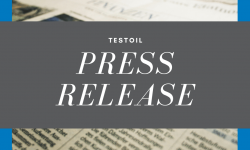CLEVELAND March 4, 2021 -- TestOil, the industry leader in lubricant analysis, explains viscosity, viscosity index, the considerations for selecting industrial oil with the correct viscosity and oil analysis testing that pinpoints issues resulting from viscosity.
TestOil Field/Data Analyst Dwon Ruffin explains, “Viscosity is the single most important physical property of a lubricant. The concept can be confusing, but you can think of viscosity this way: water has a kinematic viscosity of close to zero centistokes (cSt) while something like molasses is well over 1000 cSt.”
Today’s advanced machinery is trending toward much tighter clearances between components, enabling the use of lower viscosity oils. As long as they provide adequate surface coverage and separation, these oils reduce internal friction better than higher-viscosity oils. A lower viscosity oil makes sense in circumstances where there is low load, high speed and a lower operating/ambient temperature. Oil that’s too thin, however, can lead to insufficient oil pressure, an inconsistent lubricating film, metal-to-metal contact and wear.
Circumstances where a higher viscosity oil makes sense are just the opposite: high load, low speed and a higher operating/ambient temperature. In today’s tighter clearance situations, oil with a viscosity that is too high can clog at or near the clearance and provide almost no protection for affected components.
“Either way, when you use an oil with an incorrect viscosity, you reduce the life of the machine—in some instances rather quickly,” Ruffin said.
Regarding temperature, as oil temperature increases, viscosity decreases; resulting in lower volumetric efficiency, overheating and wear. As oil temperature decreases, viscosity increases, friction increases and excessive heat is generated. So a general rule of thumb is: high viscosity for hot temperatures and low viscosity for cold.
OEM considerations for choosing viscosity are generally load and speed, but operating temperature, which can have an extreme effect on viscosity and is often overlooked, is just as important. This is especially true if operating conditions necessitate an extreme temperature-resistant product.
Many oils resist changes in viscosity brought about by changes in temperature. This property is measured by viscosity index (VI); the higher the VI, the less viscosity is affected by temperature change. A lubricant may merit having a high VI for reasons that include varying loads, speeds and ambient temperatures. High quality, relatively expensive base oils and additives will boost VI. Conversely, less expensive, lower VI lubricants are appropriate if speeds, loads and temperatures are constant.
Even oils with a high VI will eventually provide less protection. Overall viscosity, acid number and contamination need to be monitored. Ruffin advised, “When surfaces start coming into contact with each other, they will deposit particulate in the oil, which we might see in the lab.” High levels of particulates can lead to accelerated machine wear due to abrasion.
The bottom line in that selection of the optimum fluid viscosity grade—something TestOil’s experts can help with-- will provide the most efficient machine performance.
TestOil offers viscosity testing which is a measure of a lubricant's resistance to flow (shear stress) at a specific temperature. The company also offers onsite sampling for heading off viscosity-related issues. For more information on lubrication fundamentals, visit: https://bit.ly/3pJJvIr
With more than 30 years of experience in the oil analysis industry, TestOil focuses exclusively on assisting industrial facilities with reducing maintenance costs and avoiding unexpected downtime through oil analysis program implementation. As industry experts in diagnosing oil-related issues in equipment such as turbines, hydraulics, gearboxes, pumps, compressors and diesel generators, TestOil provides customers with a guarantee of same-day turnaround on all routine testing. With in-house, certified training professionals, TestOil offers lubrication and oil analysis training, private onsite training, certification training and exams, and educational webinars. For more information on partnering with TestOil on oil analysis programs or training opportunities visit https://testoil.com. Contact: 216-251-2510; sales@testoil.com.




